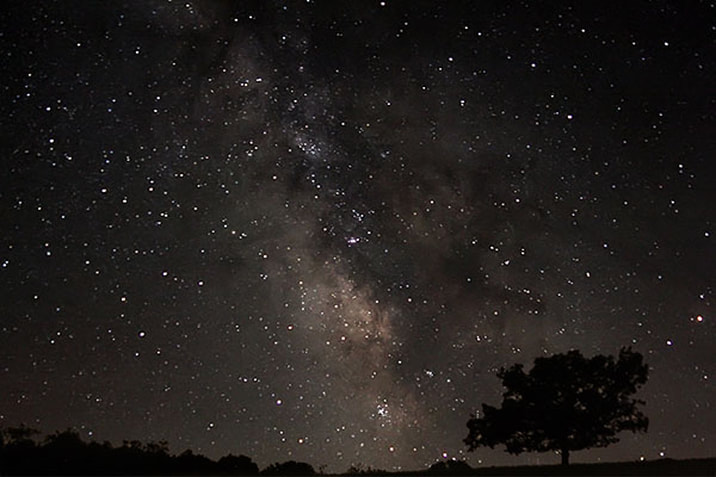|
The little things that we do every day have a huge impact on our natural world. It makes sense that native plant enthusiasts care about invasives, clean water, soil health, the warming climate, more intense weather patterns, even clean air…but what about dark skies?
Dark skies affect multiple natural processes. For example, many crops are dependent on insect pollination. If you like to eat, you care about insects and in turn, also dark skies. Insects also serve as a food source for many species. If you care about birds, you care about insects and also in turn, dark skies. Why should we do something about light pollution? Humans “around 80 percent of all—and more than 99 percent of people in the US and Europe—now live under light-polluted skies. In addition to direct lighting from urban infrastructure, light reflected from clouds and aerosols, known as skyglow, is brightening nights even in unlit habitats.” (Kwon, 2018) Many, truly do not know what unlit skies look like. In addition, insects are impacted by light pollution. The article “Light Pollution is a Driver of Insect Declines” discusses how artificial light serves as an evolutionary trap. Artificial light is a human-induced problem. Throughout ecological history, “most anthropogenic disturbances have natural analogs: the climate has warmed before, habitats have fragmented, species have invaded new ranges, and new pesticides (also known as plant defenses) have been developed. Yet for all evolutionary time, the daily cycle of light and dark, the lunar cycle, and the annual cycle of the seasons have all remained constant. insects have had no cause to evolve any relevant adaptations to artificial light at night.” (Avalon et al, 2020) Insects are attracted to the ultrabright unnatural lights and exhaust themselves before engaging in pollination or reproduction. The decline of insects lead to diminished food sources for larger organisms. Light pollution causes disorientation and exhaustion in migratory birds. Birds use energy stores to make long journeys. Studies show that “migrating birds were disoriented and attracted by red and white light (containing visible long-wavelength radiation), whereas they were clearly less disoriented by blue and green light (containing less or no visible long-wavelength radiation).” (Poot et al, 2008) The good news is that humans can put ecological practices in place to mitigate the impacts of light pollution. Further research shows that “artificial light at night impacts nocturnal and diurnal insects through effects on development, movement, foraging, reproduction, exhaustion and predation risk.” (Borges, 2022) It is estimated that light pollution is driving an “insect apocalypse” resulting in a loss of around forty percent of all bug species within just a few decades. There are multiple reasons to care about insects. We can make an impact on this serious problem. Community members can have their voices heard by participating in their local HOA meetings and completing surveys conducted by the local government in the comprehensive planning phase. By speaking out residents can weigh in on light ordinances in public spaces. Even talking to neighbors who are unaware of the problem can help. The International Dark Sky Association (https://www.darksky.org/) has great resources for educating yourself and others about light pollution. Virginia has five Dark Sky parks which are more than any other state East of Mississippi. The parks include Rappahannock County Park, Sky Meadows State Park, Staunton River State Park, James River State Park, and Natural Bridge State Park. The link to the parks can be found at https://www.darksky.org/our-work/conservation/idsp/finder/. Visiting Dark Sky parks and taking part in citizen science is an important way to help protect these amazing spaces for future generations to enjoy.
0 Comments
Your comment will be posted after it is approved.
Leave a Reply. |
Have a blog or blog idea?
Let us know (click) Other Blogs
VA Native Plant Society - click Brenda Clement Jones - click John Muir Laws' Blog - click Megan's Nature Nook - click Categories
All
Archives
September 2023
Blog Administrator:
Kathleen A. VMN since 2018 |
